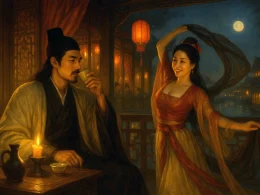From the walls of Baidi high in the coloured dawn
To Jiangling by night-fall is three hundred miles,
Yet monkeys are still calling on both banks behind me
To my boat these ten thousand mountains away.
Original Poem
「早发白帝城」
李白
朝辞白帝彩云间, 千里江陵一日还。
两岸猿声啼不住, 轻舟已过万重山。
Interpretation
This poem was composed in 759 AD during the reign of Emperor Suzong of Tang, when Li Bai was exiled to Yelang due to his association with Prince Yong Li Lin's rebellion. While passing through the Three Gorges and arriving at Kuizhou (present-day Fengjie, Chongqing), he unexpectedly received a pardon and was able to return. Filled with the exhilaration of a narrow escape, the poet penned this timeless masterpiece, vividly depicting the swift downstream journey and expressing his joy and excitement.
First Couplet: "朝辞白帝彩云间,千里江陵一日还。"
zhāo cí bái dì cǎi yún jiān, qiān lǐ jiāng líng yī rì huán.
From the walls of Baidi high in the coloured dawn. To Jiangling by night-fall is three hundred miles,
The phrase "crowned with rainbow clouds" vividly portrays the towering height of White Emperor City, emphasizing its precipitous terrain while foreshadowing the rapid river current and swift voyage. The "rainbow clouds" also depict the beautiful morning glow, symbolizing the poet's transition from a heavy heart to lighthearted joy. The contrast between "far-off" and "but one day" highlights both the river's speed and the journey's astonishing swiftness. The word "return" particularly conveys the poet's delight at regaining freedom, as if this homeward journey were naturally familiar.
Second Couplet: "两岸猿声啼不住,轻舟已过万重山。"
liǎng àn yuán shēng tí bù zhù, qīng zhōu yǐ guò wàn chóng shān.
Yet monkeys are still calling on both banks behind me. To my boat these ten thousand mountains away.
The line "from both banks, monkeys' chatter never fades away" creates a dynamic sense of movement, as if the monkeys' cries continuously sweep past the ears, evoking an atmosphere of rapid travel. "My light boat has flown past ten thousand peaks in one day" captures the boat's speed with lively imagery, making readers feel as though they are experiencing the exhilarating rush downstream. Beyond depicting scenery, this couplet subtly conveys the poet's joy at escaping misfortune, symbolizing how he has broken through life's obstacles toward freedom and brightness.
Comprehensive Analysis
With concise and spirited language, the poem sketches a dynamic riverscape. The first two lines emphasize the towering terrain and rapid journey, while the latter two depict the boat's speed and the poet's lighthearted mood. Against the backdrop of White Emperor City's height and the river's swift current, phrases like "crowned with rainbow clouds," "far-off," "but one day," "never fades away," and "flown past" create a powerful sense of motion, immersing readers in the exhilarating rush of the downstream voyage. Simultaneously, the verses subtly express the poet's excitement upon receiving the pardon—just like the wind-and-wave-riding light boat, his life has finally turned a new page.
Artistic Innovations
- Harmony of movement and stillness: The static grandeur of "crowned with rainbow clouds" contrasts with the dynamic swiftness of "but one day," creating vivid, layered imagery.
- Striking contrasts: Juxtapositions like "far-off" versus "but one day" and "monkeys' chatter never fades away" versus "flown past ten thousand peaks" heighten the sense of speed while reflecting the poet's elation.
- Emotion fused with scenery: Though describing a boat journey, the poem radiates the poet's post-pardon joy and relief, achieving deep resonance through this blending of feeling and landscape.
Insights
With effortless grace, this poem paints the majestic Yangtze River downstream journey while conveying the poet's euphoria at regained freedom. It teaches us that when facing life's trials, we should hold fast to faith—knowing difficulties will pass and light still lies ahead. The image of the swift-flying light boat symbolizes liberation from constraints and the exhilaration of moving forward, offering uplifting inspiration.
Poem translator
About the poet

Li Bai (李白), 701 - 762 A.D., whose ancestral home was in Gansu, was preceded by Li Guang, a general of the Han Dynasty. Tang poetry is one of the brightest constellations in the history of Chinese literature, and one of the brightest stars is Li Bai.












